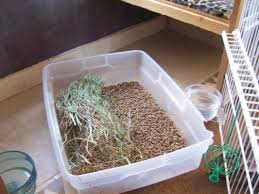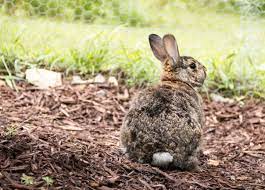Contents Table
Introduction
Benefits of Adding Rabbit Litter to Compost
Safe and Effective Rabbit Litter Composting
Which rabbit litter composts best?
Prepare Rabbit Litter for Composting
What to Consider Before Adding Rabbit Litter to Compost
Q&A
Conclusion
Introduction
Composting reduces waste and enriches garden soil. May rabbit litter be composted? Yes, however there are certain things to consider before adding rabbit litter to your compost pile. Rabbit litter can improve your compost, but you should know the hazards and advantages. This article discusses the merits and cons of adding rabbit litter to compost and optimal methods.
Benefits of Adding Rabbit Litter to Compost
Composting reduces waste and enriches garden soil. Add rabbit litter to your compost for added advantages and quality.
Plant growth requires nitrogen, which rabbit litter provides. Rabbit litter includes phosphate and potassium, two essential plant nutrients. Rabbit litter balances the carbon-nitrogen ratio in compost, which is significant.
Rabbit litter also improves compost texture. Small rabbit litter particles aerate compost and allow water and air to permeate. This accelerates composting and enriches soil.
Rabbit litter also absorbs compost moisture. This reduces mould and bacteria growth in compost by preventing overwatering.
Finally, rabbit litter reduces compost odours. Rabbit litter absorbs odours and prevents them from escaping.
Rabbit litter has many composting benefits. Rabbit litter adds nitrogen, improves compost texture, absorbs moisture, and reduces odours. Each of these benefits can enrich your garden soil with nutrients.
Safe and Effective Rabbit Litter Composting
Composting rabbit litter reduces waste and enriches garden soil. Rabbit litter must be composted securely and effectively to avoid health problems. This guide explains how to compost rabbit litter safely.
First, learn which rabbit litter can be composted. Materials for rabbit litter include wood shavings, straw, hay, and paper. Chemical litters like cedar shavings can poison plants, so avoid them.
After selecting a litter, prepare the compost pile. Make sure the compost pile is well-ventilated and out of direct sunlight. For appropriate aeration, the pile should be three feet deep and turned regularly.
Add rabbit litter to the compost pile next. Spread litter evenly over the mound and mix it with leaves, grass clippings, and vegetable scraps. This helps balance compost piles.
Finally, check the compost pile to guarantee proper decomposition. Turn the pile often and keep it damp but not wet. The compost pile should reach 140 degrees Fahrenheit to destroy microorganisms.
Compost rabbit litter safely and successfully using these steps. Composting rabbit litter reduces waste and enriches garden soil.
Which rabbit litter composts best?
Composting rabbit litter reduces waste and enriches garden soil. Rabbit litter contains hay, straw, and other organic components, making it suitable for composting. But not all rabbit litter can be composted. These rabbit litters compost well:
1. Hay: Hay composts rabbit litter well. Its nitrogen content feeds the compost pile. It aerates and prevents the pile from flooding.
2. Straw: Straw composts rabbit litter well too. It balances nitrogen in the compost pile with its high carbon content. It also prevents pile saturation.
3. Wood shavings compost rabbit litter well. Their high carbon content aerates the pile. They also prevent pile saturation.
4. Alfalfa Pellets: Great for composting rabbit litter. Nitrogen-rich, they nourish the compost pile. They aerate and prevent the pile from flooding.
The correct rabbit litter for composting can provide nutrient-rich soil for your garden. Your plants will thrive with this.
Prepare Rabbit Litter for Composting
Composting rabbit litter recycles organic material and enriches garden soil. Hay, straw, and droppings from rabbits can be composted to provide nutrient-rich garden fertiliser. Prepare rabbit litter before adding it to your compost pile to guarantee safety and efficacy.
Remove large bits of hay or straw before composting rabbit litter. They take a long time to break down and can upset the compost pile. After removing large pieces, spread the litter thinly and let it dry. This will reduce litter moisture and make it easier to break down.
After drying, mix litter with leaves, grass clippings, and kitchen wastes. This will balance and speed up compost pile breakdown. Rabbit litter to organic materials should be 1:3.
Finally, turn the compost pile regularly to ensure optimal breakdown. The compost will be aerated and kept at the right moisture level. Turn the compost weekly or more often if it's not breaking down quickly.
These steps will prepare rabbit litter for composting. This creates nutrient-rich compost that can fertilise your garden and help your plants thrive.
What to Consider Before Adding Rabbit Litter to Compost
Composting reduces waste and enriches garden soil. Rabbit litter can benefit your compost pile, but there are some things to consider.
First, the rabbit litter must be chemical- and medication-free. The compost pile should not contain chemically treated litter. Additionally, the litter should be devoid of parasites and diseases that could affect other animals or plants.
Second, evaluate the rabbit litter you use. If the litter is wood shavings, put it to the compost pile. Clay litter or other non-biodegradable litter should not be composted.
Finally, consider how much rabbit litter you put to the compost pile. Too much rabbit litter can upset the compost pile, making it anaerobic and lower its quality. Add modest amounts of rabbit litter at a time and monitor the compost pile to avoid overwetting or drying.
Before adding rabbit litter to your compost pile, consider these things to ensure high-quality compost that provides the best nutrients for your crop.

Q&A
1. Is rabbit litter compostable?
You can compost rabbit litter. Rabbit litter enriches compost with nitrogen and other nutrients.
2. What rabbit litter should I use?
Use organic rabbit litter like wood shavings, straw, or hay. Avoid chemical-based trash, which is hazardous to plants.
3. Add how much rabbit litter to compost?
One cup of rabbit litter per five litres of compost is recommended.
4. Are there any other considerations before adding rabbit litter to compost?
Rabbit litter should be totally dry before composting. Rabbit litter can make compost overly moist and anaerobic.
5. How can adding rabbit litter to compost help?
Rabbit litter adds nitrogen and other nutrients to compost, speeding up the process. It can also improve compost texture, making it easier to deal with.
Conclusion
Finally, rabbit litter can be composted with safeguards. Compost rabbit litter separately or with leaves, grass clippings, and other organic waste. To guarantee optimal compost breakdown, monitor the compost pile's temperature and moisture. Follow these methods to make compost safe for gardening.
